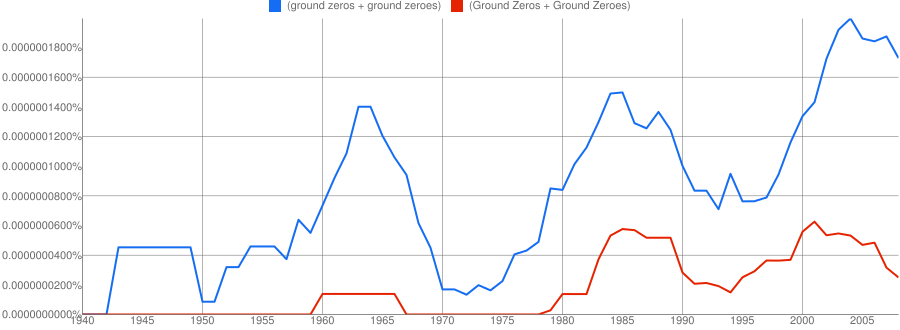ground zeros or ground zeroes
While "ground" and "zero" are both both adjectives and nouns on their own, "ground zero" is a compound noun in which neither "ground" nor "zero" serves as noun or adjective of the other but in their entirety as a phrase are a noun. As such, "ground zero" gets pluralized in its entirety as a phrase, meaning the pluralizer comes after the entire thing rather than parsing out a particular noun within it. This is borne out by usage as Google Ngram shows myriad examples of it being pluralized in published works as "ground zeros" or "ground zeroes" but no examples of it being pluralized as "grounds zero," grounds zeros," or "grounds zeroes."
As for whether to use "es" or just "s" to pluralize it, it would follow how "zero" is normally pluralized when it is by itself. There have been several questions on Stack Exchange sites that give excellent answers regarding "zeros" versus "zeroes" as regards pluralization of "zero" and as regards pluralization of "zero" when found in a compound noun (e.g., double zero), including:
Upon reviewing those answers, we may surmise that what it boils down to is personal preference. That is unless you are beholden to a particular style guide that requires either "es" or "s" for pluralization after instances of "zero."
Dissenting Opinion:
simply ground zero (not ground zeros or ground zeroes)
I did find one source that disagreed with this: Collins Dictionary defines "ground zero" as a noncount noun.
If a nouncount noun or if being used as such, it would not take any pluralization. Pluralizing it would indicate types of ground zero and not plural locales. It being a nouncount noun, or striclty a nouncount noun, is not borne out by usage, though, as evidenced by Google Ngram.
English being a descriptive rather than prescriptive language, the multitudinous use of "ground zero" as a count noun descriptively indicates that it is at the very least also a count noun.
Nevertheless, I would be remiss not to mention this, for what this means is that an alternative to "ground zeros" or "ground zeroes" is simply "ground zero," for example, "ground zero of Hiroshima and Nagasaki," which, of course, could be misconstrued as each sharing the same ground zero, but that is the nature of nouncount nouns, no different than saying "information of Hiroshima and Nagasaki" possibly being misconstrued as shared information when each has different information.
Incidentally, not pluralizing and simply saying "ground zero" is further underpinned by the presence of "ground" in the noun "ground zero." Just like the rules for the pluralization of "zero" have bearing on how we treat "ground zero," we could surmise grammatical rules for its individual elements might also extend to the treatment of the whole, and since "ground" is generally treated as a nouncount noun (e.g., "The ground of Hiroshima and Nagasaki was irradiated by..."), the validity of using "ground zero" as a nouncount noun is further underpinned, which, by the way, doesn't disprove using it as a count noun.

